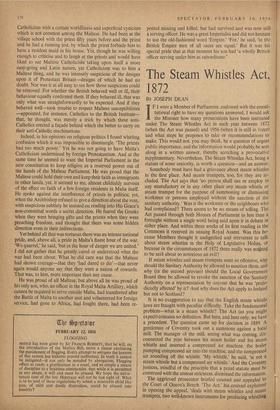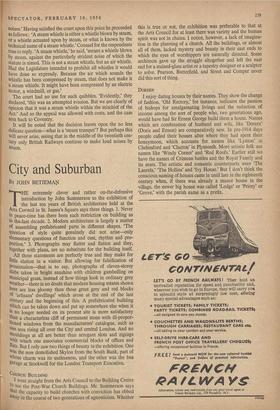The Steam Whistles Act, 1872
BY JOSEPH DEAN F were a Member of Parliament, endowed with the consti- tutional right to have my questions answered, I would ask the Minister how many prosecutions have been instituted under The Steam Whistles Act in each year between 1872 (when the Act was passed) and 1956 (when it is still in force) and what steps he proposes to take or recommendations to make. This would not. you may think, be a question of urgent public importance, and the information would probably, be sent along in a written answer, thereby scotching a provocative supplementary. Nevertheless, The Steam Whistles Act, being a statute of some seniority, is worth a question—and an answer. Somebody must have had a grievance about steam whistles in the first place. And steam trumpets, too, for they are in- cluded. The Act says that 'no person shall use or employ in any manufactory or in any other place any steam whistle or steam trumpet for the purpose of summoning or dismissing workmen or persons employed without the sanction of the sanitary authority.' Was it the workmen or the neighbours who had complained? There seems to be no means of telling. The Act passed through both Houses of Parliament in less than a fortnight without a single word being said upon it in debate in either place. And within three weeks of its first reading in the Commons it received its unsung Royal Assent. Was this be- cause Members thought it undignified and irreverent to talk about steam whistles in the Holy of Legislative Holies, or because in the circumstances of 1872 there really was nothing to be said about so notorious an evil?
If steam whistles and steam trumpets were so offensive, why should the Sanitary Authority be allowed to sanction them, and why (in the second proviso) should the Local Government Board then be allowed to revoke the sanction of the Sanitary Authority on a representation by anyone that he was 'preju- dicially affected' by it? And why does the Act apply to Ireland but not to Scotland?
It is no exaggeration to say that the English steam whistle laws are fraught with peculiar difficulty. Take the fundamental problem—what is a steam whistle? The Act (as you might expect) contains no definition. But here, and here only, we have a precedent. The question came up for decision in 1889. A gentleman of Coventry took out a summons against a local mill. The manager of the mill, seeing what was coming, dis- connected the pipe between his steam boiler and his steam whistle and inserted a compressed air machine, the boiler pumping compressed air into the machine, and the compressed air sounding off the whistle. 'My whistle,' he said, 'is not a steam whistle but a compressed air whistle.' And the Coventry justices, mindful of the principle that a penal statute must be construed with the utmost strictness, dismissed the information.
The aggrieved prosecutor briefed counsel and appealed to the Court of Queen's Bench. 'The Act.' his counsel,explained in opening the appeal, 'deals with steam whistles and steam trumpets, two well-known instruments for producing whistling noises.' Having satisfied the court upon this point he proceeded as follows : 'A steam whistle is either a whistle blown by steam, or a whistle actuated upon by steam, or what is known by the technical name of a steam whistle.' Counsel for the respondents rose to reply. 'A steam whistle,' he said, 'means a whistle blown by steam, against the particularly strident noise of which the statute is aimed. This is not a steam whistle, but an air whistle. Had the Legislature intended to prohibit all whistles it would have done so expressly. Because the air which sounds the whistle has been compressed by steam, that does not make it a steam whistle. It might have been compressed by an electric motor, a windmill, or gas.'
The court had no use for such quibbles. 'Evidently,' they declared, 'this was an attempted evasion. But we are clearly of opinion that it was a steam whistle within the mischief of the Act.' And so the appeal was allowed with costs, and the case sent back to Coventry.
It will be noted that the decision leaves open the no less delicate question—what is a 'steam trumpet'? But perhaps this will never arise, seeing that in the middle of the twentieth cen- tury only British Railways continue to make loud noises by steam.



































 Previous page
Previous page